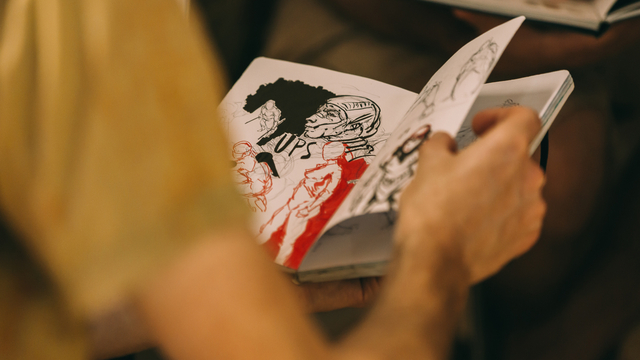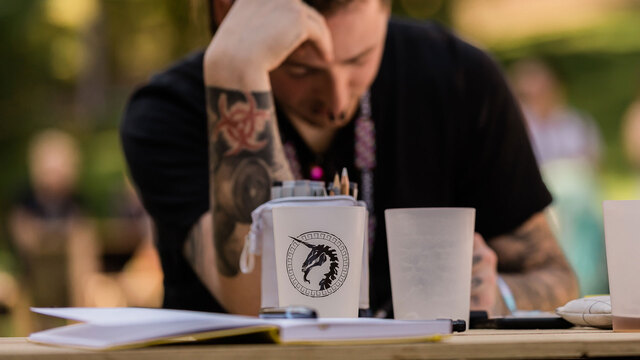Not good enough, not qualified enough, doubting yourself, having trouble accepting positive feedback, thinking it’s chance or external factors that have led you to accolades and career opportunities, worried that any day now someone will discover it’s all a lie; that you’re not as good as they think you are.
Sound familiar?
If any of this resonates, know that you’re not alone. Imposter syndrome affects most people at some stage in their life. Michelle Obama, Tom Hanks, Maya Angelou, John Steinbeck, Tina Fey, Robin Williams, and even the great Michelangelo, all suffered from it. It’s blind to age, gender, experience level, and craft, so anyone - student, musician, athlete, CEO, intern, artist, and the wealth in between, is susceptible. Is imposter syndrome holding you back from submitting to challenges such as The Sony Talent League, from believing in yourself, and from achieving your greatest potential? You deserve better. Let’s take a look at tactics to quell the beast.
Challenge the narrative
Ok, so you’ve told yourself a “nice” little story. That the latest gig you secured, recognition you received, promotion you were given, was because of dumb luck, or some combination of factors that you had no hand in. Or worse still, you’ve convinced yourself that you don’t have what it takes to apply to that inspiring challenge or job. Time you question the false narratives.
The next time you hear that nagging voice telling you that you’re not good enough, or not deserving of something, don’t just take it as fact, challenge it. For example, you think your latest achievement was a fluke? It’s time for some real talk. Ask yourself what steps you took or work you put in to get there. You think you’re not good enough to submit to an art challenge? Take a genuine look at your skills and talent. Know that we’re all works in progress. Be honest with your answers. And remember, you grow and learn by doing.
Celebrate what YOU bring to the table.
We’re constantly comparing ourselves, our talents and our achievements, to others. It’s human nature. It can provide healthy competition and impetus to drive us forward. But taken too far, it can also hold us back.
Ian Spriggs, renowned 3D portrait character artist and THU knight, admits that he felt like an imposter the first time he attended THU: “[Surrounded by] so many good artists and directors, and here I was giving a talk right next to them, it felt weird.” He could have let that internal monologue hold him back, but instead he realized that art isn’t about “comparing yourself to others and thinking that they are more than you, it’s about sharing your own story.” Being at THU taught him that he’s not alone, that he’s important in his own way, and that his story holds value. He learned to reframe how he saw the experience and himself: “After a few years I started to realize I was offering something different to them, it wasn't a competition because I could share something new which others could learn from.”
Whatever it is that you’re working on, wherever you are in your knowledge and skill level, know that there is no one else quite like you. Your perspective and what you create is unique. Don’t aspire to be like someone else, be the best version of yourself instead. Celebrate that, own your accomplishments, and focus on what you can offer and want to learn.
Use it to your advantage
Everyone has moments where they doubt their abilities. But what sets those who succeed apart from those who fail, is what they chose to do in those moments. What areas do you feel you need to improve in and how do you go about doing that? Take feedback that’s valid and use it to become a better artist.
Self-taught 3D artist and THU tribe member, Victor Hugo Queiroz has worked with leading companies such as Walt Disney Animation Studios, Blur Studios, Ubisoft, Netflix, and he had the honor to be the very first 3D cover artist in Marvel history. He sees imposter syndrome as “part of his personality” but he’s always looking to “transform self-doubt into motivation.” His advice: “use your flaws as fuel. Question why you consider yourself a fraud and try to work those ‘weak points’ to not be a fraud anymore.” The best part of his approach: “when the imposter syndrome passes you will be surprised with how much you evolved!”
Wherever you are in your career, you’ll always have areas to improve in. We all do. Take things one step at a time, make sure the feedback you’re telling yourself is accurate, and take steps to keep progressing.
Reach out
Celebrated author Neil Gaiman once spoke about his experience meeting astronaut Neil Armstrong. They were at a gathering of important people and he discovered, to his surprise, that they both shared imposter syndrome. After learning this, he conceded, “I felt a bit better. Because if Neil Armstrong felt like an imposter, maybe everyone did. Maybe there weren’t any grown-ups, only people who had worked hard and were slightly out of their depth, all of us doing the best job we could, which is all we can really hope for.”
Imposter syndrome can cause or heighten stress, sleeplessness, feelings of anxiety, fear, depression, and can fuel perfectionist tendencies and procrastination. Don’t suffer in silence. Reach out to peers, mentors, friends and let them know how you’re feeling and what you’re going through. Chances are, even those you most respect and look up to have experienced similar. Knowing that you’re not alone brings comfort, power, and a new perspective.
Dare to think differently
Shuzo John Shiota, President/CEO of Polygon Pictures and member of the Talent League jury panel, has never felt like an imposter. Why? Because he believes “you’re never ‘something’; nothing about life is static.” He references a poignant line in Ken Liu’s science fiction story Mono no Aware: “We are defined by the places we hold in the web of others’ lives.” The way Shuzo sees it, we’re all a part of a whole: “You’re always relative to the people, things and times that surround you.” As such, to paraphrase him, you’re never fully deserving or undeserving of the position or status you currently occupy, because “it’s never you alone that makes that position or status possible. It’s merely a state you’re fulfilling within the community at a particular time.” When you think about it in those terms, it’s easy to shift perspective and see how this can be a blessing. As he put it: “it takes the load off my back, yet reminds me to be responsible for the well being of a community.”
You are an individual, but you are also part of a whole, and part of our THU tribe. We’re here to support, encourage and celebrate you. And together we can face any adversity. Each day you’re discovering more about yourself, your creativity, and your boundless potential. And with each step forward, big or small, your future becomes all the brighter as you grow and thrive. So trust that you’re capable and worthy. It’s time to believe in yourself and embrace the possibilities. We can’t wait for you to discover what we’ve seen in you all along.




